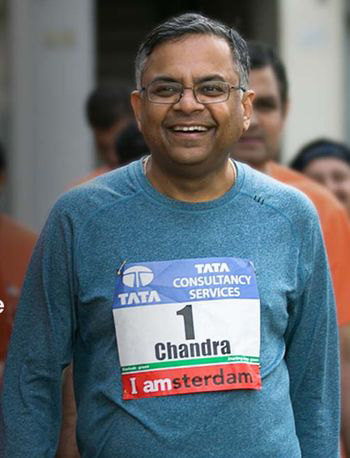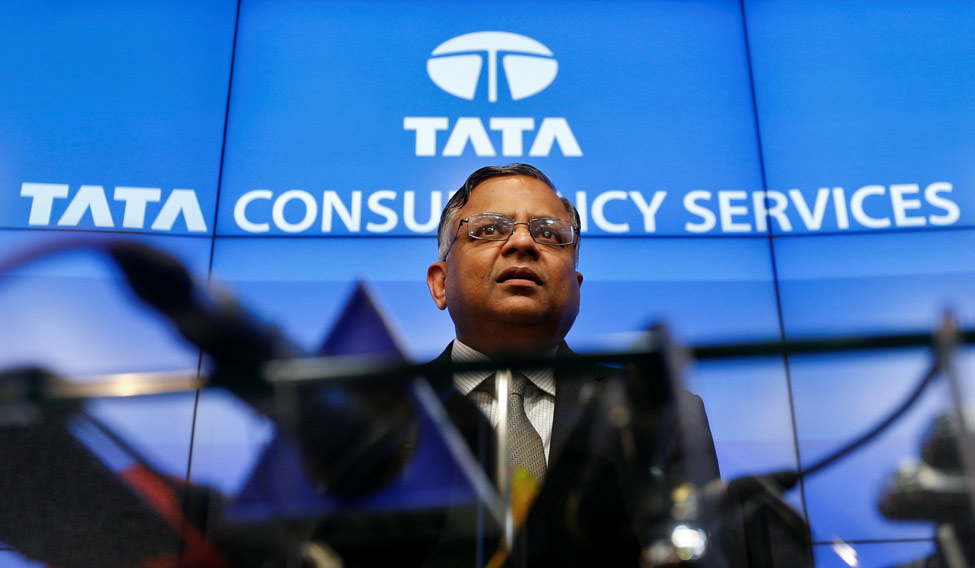"Running opens the windows of my mind... you may call me a long distance thinker," said Natarajan Chandrasekaran soon after completing the Amsterdam Marathon in 2015. The head of TCS, the crown jewel in the Tata empire and by far its most profitable entity, added: "Running a business is like running a marathon." Indeed, the IT bellwether's Miracle Man who in the six years since he took over as CEO in 2009, has seen its profits almost triple from $6 billion to $16.5 billion, turned Marathon Man quite late in his career —at age 45 when his doctor advised him to jog daily or succumb to diabetes.
What started as a daily 5 am run in Mumbai's Worli Sea Face ( where he lives), became a passion that he transmitted with stunning effect to his staff: today 70,000 of them run regularly at open Marathons, many of them sponsored by TCS worldwide.
On January 12, Chandrasekaran, saw his run take him to the famed corner room in Bombay House, the iconic 4-storey Malad stone structure in the Fort area of Mumbai which is the global headquarters of the Tata group of companies and the office of the Chairman of Tata Sons. Chandra as he is known to friends and colleagues is the first non-Parsi to head this respected exemplar of Parsi enterprise, whose previous chairmen have included founder Jamsetji Tata from 1887 to 1904, Dorabji Tata from 1907-1932, JRD Tata from 1938 -1991 and Ratan Tata from 1991 to 2012. Even the non-Tata chairmen like Nowroji Saklatwala and Cyrus Mistry were members of the same community.
In that sense, Chandra is the first "outsider" to head the Tata empire and at 53, one of the youngest. But only in a narrow sectarian sense that is meaningless today. He is in fact the quintessential insider: a Tata employee who joined the company's flagship, TCS, exactly 30 years ago, in January 1987, as an intern, doing project work for his Master of Computer Applications (MCA) degree from REC (Now National Institute of Technology), Trichy, and never left. He was formally hired in 1987 as a software programmer and was soon working on projects for some of TCS's offshore clients. The work he did for a Washington DC client in the early 1990s was chosen for a Best Project award. The then TCS CEO, F. C. Kohli and Chandra's group head, S. Ramadorai, went to the client site to receive the award.
Ramadorai writes in his autobiography, The TCS Story and Beyond: "The clients said good things about him (Chandra). I asked him to come and meet me. We took it from there."
'There' meant Chandra joining Ramadorai as Executive Assistant, as soon as the latter took over from Kohli as head of TCS in 1996. This grooming was to prove crucial. "Ram provided me every opportunity to grow emotionally and professionally," says Chandra. His first independent task was to oversee TCS operations in the Santa Cruz Electronic Export Promotion Zone (SEEPZ). He helped TCS move away from being just another Indian IT company that exploited the Y2K or Year 2000 opportunity to a globally respected e-business leader.
 N. Chandrasekaran after completing the Amsterdam Marathon in 2005
N. Chandrasekaran after completing the Amsterdam Marathon in 2005
So when Ramadorai retired in 2009 after 37 years with TCS, Chandra smoothly slipped into the CEO seat with minimum disruption. He already had a reputation as an approachable man of action—he still spends 200 days in a year visiting the global outposts of TCS. His fellow leaders in IT companies know and respect him as an aggressive but fair competitor. Abidali Z. Neemuchwala, CEO , Wipro said: "A global business leader with boldness of vision and drive for results, Chandra personifies the value system of the Tatas and is a great choice to lead India's largest business house. "Infosys co-founder N. R. Narayana Murthy, called Chandra "a tall leader of the Indian IT Industry with a stellar record.. a great human being, smart, simple, value based." Fellow jogger and serial runner Anil Ambani, says Chandra brings an unparalleled track record of value creation and visionary leadership. I have run many marathons with him... he is the complete package."
In homing in on Chandra to head Tata Sons, the selection panel has carried out its mandate at multiple levels. The news of his elevation, came only hours after he announced TCS's financial results for the third quarter of 2016-17: in a generally doom-and-gloom scenario for Indian tech companies, faced with patently unfair restrictions being placed in their major market, the US and a general recession that is seeing reduced enterprise spends worldwide, TCS still managed to see profits go up since October 2016 by 1.6 per cent to touch $1 billion for the first time. TCS has been for the Tata group, the entity that has contributed 10 percent of its total revenues, 40 per cent of its profits, and perhaps most crucially, 70 percent of its market value. To select the person who has presided over this success story is clearly a no-brainer. But Chandra selected himself in other nuanced ways. He has been part of Tata for three decades. He enjoys the confidence of its leadership and a rapport with its Bhishma pitamaha, Ratan Tata. These qualities will be crucial to bring the smack of business back to a group whose reputation, in one way or another has been tarnished in the three months after it decided to remove the incumbent Chairman. Many in the industry believe that the affair could have been handled better and others rightly or wrongly, see a small kink in the Tatas's unblemished record for corporate governance.
There is also the unspoken concern that the somewhat unusual corporate arrangements in the Tata Group, have seen the non-profit and non-executive Tata trusts exert, what outsiders felt was undue influence in hard-nosed business matters. Chandra's charm may yet find a graceful and commercially savvy solution here.
He will also have to deal head on with the harsh reality that many of the Tata Group's marquee companies—Tata Steel, Tata Motors, Tata Teleservices, Indian Hotels—haven't been doing too well. As head of TCS, Chandra delivered spectacularly. As head of the entire Tata family, he will now have to work to reduce the group's reliance on TCS to bail it out and keep the combined balance sheet respectable. He has been candid in admitting he has little experience in such heavy industries. But his mentor Ramadorai showed the way: surround yourself with bright brains, and delegate. Will that be the Chandra mantra? We have to wait and see.
Meanwhile the Marathon Man is, we can be sure, getting set for his new challenge, may be his biggest yet. This is no fixed challenge of 42.2km. This is a race that stretches into the distant unknown. And there are few refuelling stops.




